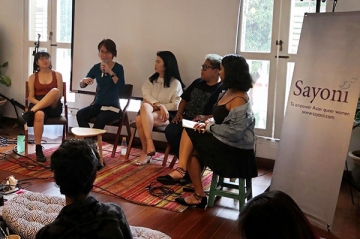This is a strategy that can be used when your survival or sanity or emotional well-being is at stake. It can be the only reasonable option for someone hopelessly stuck. Suffice to say, when debt flight occurs, the relationship is permanently severed. (And a good thing this is… if you are experiencing great distress!)
Before you flee, declare WHY you are unable to meet the terms of payment. It might be good to be clear on why you are unable to do so. This facilitates closure.
In the scenario above, Kate can tell Jessie that she is unable to play the part of a lover, because Kate does not perceive romantic attraction between them anymore.
What if you are holding yourself in debt when noone else is?
We are a bunch of people who blame ourselves a lot! Surprising but true.
As parents, they go, “Did i bring my child up properly? Why is she like that! It’s my fault… something went amiss with my way of upbringing… ”
As students, we go, “Why did i do badly? I didn’t work hard enough! I failed my parents…”
As girlfriends, we go, “Am i good enough for my girlfriend? Did i do this right? Am i treating her the best i can?”
As victims, they go, “I brought this upon myself.”
My take: see a counselor.
In such situations, it is best to determine if you are indeed culpable. For about 99% of incidents/circumstances, it takes MANY factors to come to that. To blame yourself continuously is unproductive. After all, human beings are not heavenly angels. In such instances, trouble-shoot!
Trouble-shooting is much better than going (set in repeat-mode):
“This is all my fault! How can i be like this… why did i do this… i am fully responsible… *sobs* *sighs* *scratches head till hair falls out*”
Unfruitful. Period.
A trouble-shooter goes:
What went wrong?
How to circumvent/prevent that?
How to minimize the damage now that it has occurred?
And make a point not to repeat that mistake.
———————————-
Next up: Creditors… when those you hold in debt don’t pay up.
Alright Creditors…
Here goes a paragraph of forgiveness.
I really don’t want to nag because all of us have been well-taught by our parents on forgiveness (yes?). So i will just give you the gist of what i want to say.
The basis for human forgiveness:
Human beings are flawed. We all make mistakes. That’s why we need forgiveness. Noone deserves forgiveness… forgiveness in itself means the other party is undeserving.
Forgiveness does not mean forgetting.
In fact, it might be perilous for you to forget, in the event that physical/emotional harm has been inflicted. You need to be aware of precedence of certain incidents so that you can take prevention measures. This is “protecting yourself”.
Forgiveness does not mean acceptance.
Forgiving someone does not mean you condone what was done. Imagine if your partner cheated on you repeatedly. You have given her the 100th second chance and your heart is in pieces. You are an utter wreck.
It’s time to move on baby~!
Forgiveness means letting go of the resentment. It is a personal release. This may not happen overnight. You might experience occasional pangs of hatred/resentment. But if you want to, you can make a commitment to forgive. This means dealing with your resentment and consciously making sure, as best as you can, that it does not affect the other party (this is especially important when you undergo debt settlement- refer to previous post).
Don’t want to forgive (release the resentment)?
Okay… the only other alternative: wallow in misery, hatred and blame.
Your call… *winks*
——————————
Concepts from You Owe Me- The emotional debts that cripple relationships by Eric J. Cohen and Gregory Sterling.




Comments
November 3, 2007 at 1:33 am
[...] i’m a femme* http://blog.sayoni.com/2006/11/05/emotional-debts-4-escaping-debts-and-forgiveness/ [...]
RSS feed for comments to this post